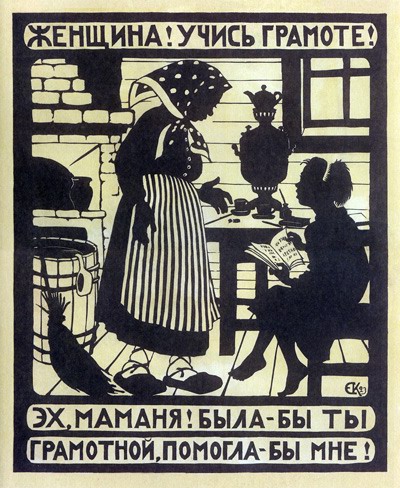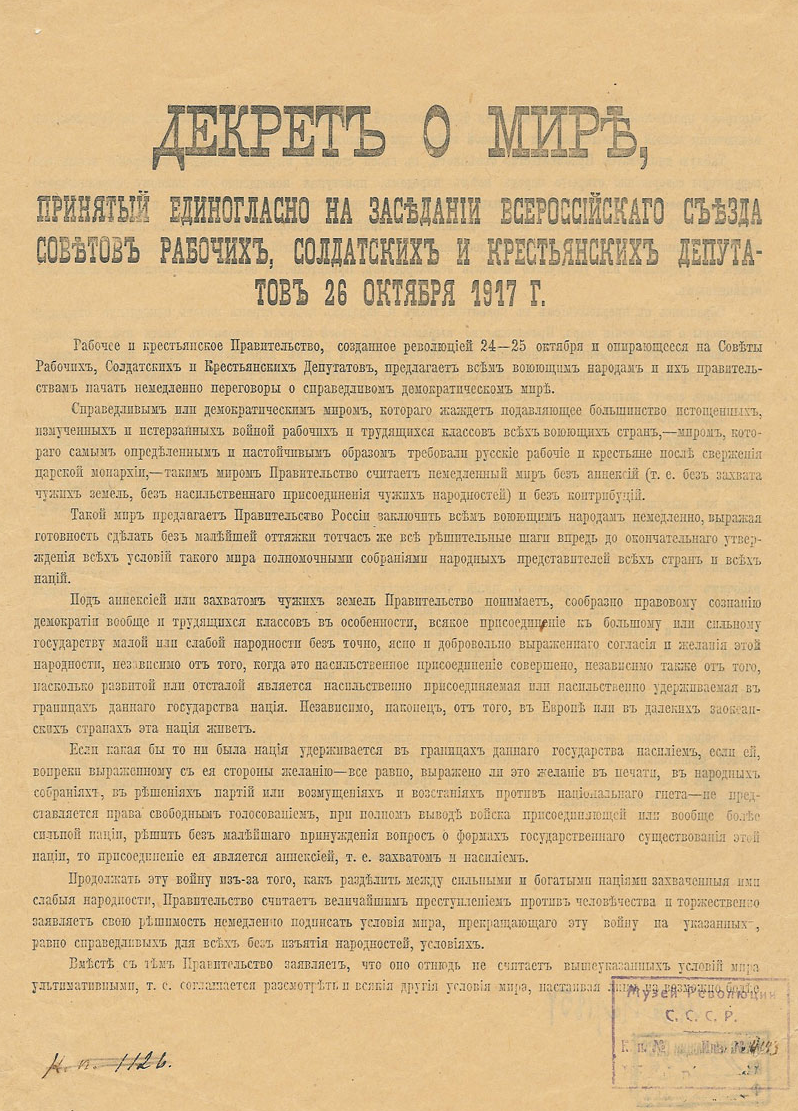|
Likbez
Likbez (russian: ликбе́з, ; from a Russian abbreviation for russian: ликвида́ция безгра́мотности, translit=likvidatsiya bezgramotnosti, label=none, , meaning "elimination of illiteracy") was a campaign of eradication of illiteracy in Soviet Russia and to Soviet Union in the 1920s and 1930s. The term was also used for various schools and courses established during the campaign. Nowadays, this term is sometimes used in Russian as a slang for answers on common questions. Background In 1897, the overall literacy rate of the Russian Empire was an estimated 24%, with the rural literacy rate at 19.7%. There were few schools available to the population, particularly in rural areas. Until the early 20th century, there were still no specific curricular plans or guidelines in the zemstvo schools. In 1891, the literacy schools came under church administration, and maintained a largely religious curriculum, which emphasized the teaching of old Church Slavoni ... [...More Info...] [...Related Items...] OR: [Wikipedia] [Google] [Baidu] |
Soviet Union
The Soviet Union,. officially the Union of Soviet Socialist Republics. (USSR),. was a transcontinental country that spanned much of Eurasia from 1922 to 1991. A flagship communist state, it was nominally a federal union of fifteen national republics; in practice, both its government and its economy were highly centralized until its final years. It was a one-party state governed by the Communist Party of the Soviet Union, with the city of Moscow serving as its capital as well as that of its largest and most populous republic: the Russian SFSR. Other major cities included Leningrad (Russian SFSR), Kiev (Ukrainian SSR), Minsk ( Byelorussian SSR), Tashkent (Uzbek SSR), Alma-Ata (Kazakh SSR), and Novosibirsk (Russian SFSR). It was the largest country in the world, covering over and spanning eleven time zones. The country's roots lay in the October Revolution of 1917, when the Bolsheviks, under the leadership of Vladimir Lenin, overthrew the Russian Provisional Government ... [...More Info...] [...Related Items...] OR: [Wikipedia] [Google] [Baidu] |
People's Commissariat For Education
The People's Commissariat for Education (or Narkompros; russian: Народный комиссариат просвещения, Наркомпрос, directly translated as the "People's Commissariat for Enlightenment") was the Soviet agency charged with the administration of public education and most other issues related to culture. In 1946, it was transformed into the Ministry of Education. Its first head was Anatoly Lunacharsky. However he described Nadezhda Krupskaya as the "soul of Narkompros". Mikhail Pokrovsky, Dmitry Leshchenko and Evgraf Litkens also played important roles. Lunacharsky protected most of the avant-garde artists such as Vladimir Mayakovsky, Kazimir Malevich, Vladimir Tatlin and Vsevolod Meyerhold. Despite his efforts, the official policy after Joseph Stalin put him in disgrace. Narkompros had seventeen sections, in addition to the main ones related to general education, e.g., * Likbez, a section for liquidation of illiteracy, * " Profobr", a section for pro ... [...More Info...] [...Related Items...] OR: [Wikipedia] [Google] [Baidu] |
Soviet Decrees
Decrees (russian: декреты) were legislative acts of the highest Soviet institutions, primarily of the Council of People's Commissars (the highest executive body) and of VTsIK (the highest legislative body between sessions of the Congress of Soviets), issued between 1917 and 1924. Such acts issued after 1924 are referred to as Decisions (russian: постановление) or s in Soviet sources. Bolshevik Initial Decrees [...More Info...] [...Related Items...] OR: [Wikipedia] [Google] [Baidu] |
Vladimir Lenin
Vladimir Ilyich Ulyanov. ( 1870 – 21 January 1924), better known as Vladimir Lenin,. was a Russian revolutionary, politician, and political theorist. He served as the first and founding head of government of Soviet Russia from 1917 to 1924 and of the Soviet Union from 1922 to 1924. Under his administration, Russia, and later the Soviet Union, became a one-party socialist state governed by the Communist Party. Ideologically a Marxist, his developments to the ideology are called Leninism. Born to an upper-middle-class family in Simbirsk, Lenin embraced revolutionary socialist politics following his brother's 1887 execution. Expelled from Kazan Imperial University for participating in protests against the Russian Empire's Tsarist government, he devoted the following years to a law degree. He moved to Saint Petersburg in 1893 and became a senior Marxist activist. In 1897, he was arrested for sedition and exiled to Shushenskoye in Siberia for three years, where he married ... [...More Info...] [...Related Items...] OR: [Wikipedia] [Google] [Baidu] |
Narkompros
The People's Commissariat for Education (or Narkompros; russian: Народный комиссариат просвещения, Наркомпрос, directly translated as the "People's Commissariat for Enlightenment") was the Soviet agency charged with the administration of public education and most other issues related to culture. In 1946, it was transformed into the Ministry of Education. Its first head was Anatoly Lunacharsky. However he described Nadezhda Krupskaya as the "soul of Narkompros". Mikhail Pokrovsky, Dmitry Leshchenko and Evgraf Litkens also played important roles. Lunacharsky protected most of the avant-garde artists such as Vladimir Mayakovsky, Kazimir Malevich, Vladimir Tatlin and Vsevolod Meyerhold. Despite his efforts, the official policy after Joseph Stalin put him in disgrace. Narkompros had seventeen sections, in addition to the main ones related to general education, e.g., * Likbez, a section for liquidation of illiteracy, * " Profobr", a section for pro ... [...More Info...] [...Related Items...] OR: [Wikipedia] [Google] [Baidu] |
Azerbaijan Soviet Socialist Republic
Azerbaijan ( az, Азәрбајҹан, Azərbaycan, italics=no), officially the Azerbaijan Soviet Socialist Republic (Azerbaijan SSR; az, Азәрбајҹан Совет Сосиалист Республикасы, Azərbaycan Sovet Sosialist Respublikası, italics=no, links=no; russian: Азербайджанская Советская Социалистическая Республика �зССРAzerbaydzhanskaya Sovetskaya Sotsialisticheskaya Respublika zSSR}), also referred to as Soviet Azerbaijan, was one of the constituent republics of the Soviet Union between 1922 and 1991. Created on 28 April 1920 when the Russian Soviet Federative Socialist Republic brought pro-Soviet figures to power in the region, the first two years of the Azerbaijani SSR were as an independent country until incorporation into the Transcausasian SFSR, along with the Armenian SSR and the Georgian SSR. In December 1922, the Transcaucasian SFSR became part of the newly established Soviet Union. The ... [...More Info...] [...Related Items...] OR: [Wikipedia] [Google] [Baidu] |
Bolsheviks
The Bolsheviks (russian: Большевики́, from большинство́ ''bol'shinstvó'', 'majority'),; derived from ''bol'shinstvó'' (большинство́), "majority", literally meaning "one of the majority". also known in English as the Bolshevists,. It signifies both Bolsheviks and adherents of Bolshevik policies. were a far-left, revolutionary Marxist faction founded by Vladimir Lenin that split with the Mensheviks from the Marxist Russian Social Democratic Labour Party (RSDLP), a revolutionary socialist political party formed in 1898, at its Second Party Congress in 1903. After forming their own party in 1912, the Bolsheviks took power during the October Revolution in the Russian Republic in November 1917, overthrowing the Provisional Government of Alexander Kerensky, and became the only ruling party in the subsequent Soviet Russia and later the Soviet Union. They considered themselves the leaders of the revolutionary proletariat of Russia. Their beli ... [...More Info...] [...Related Items...] OR: [Wikipedia] [Google] [Baidu] |
Russian Revolution And The Emancipation Of Women
The Russian Revolutions of 1917 saw the collapse of the Russian Empire, a short-lived provisional government, and the creation of the world's first socialist state under the Bolsheviks. They made explicit commitments to promote the equality of men and women. Many early Russian feminists and ordinary Russian working women actively participated in the Revolution, and all were affected by the events of that period and the new policies of the Soviet Union. The provisional government that took power after the February 1917 overthrow of the tsar promoted liberalism and made Russia the first major country to give women the right to vote. As soon as the Bolsheviks took power in October 1917, they liberalized laws on divorce and abortion, decriminalized homosexuality, and proclaimed a new higher status for women. Inessa Armand (1874-1920), Alexandra Kollontai (1872-1952), Nadezhda Krupskaya (1869-1939) and Aleksandra Artyukhina (1889–1969) were prominent Bolsheviks. Outside the Bolsheviks ... [...More Info...] [...Related Items...] OR: [Wikipedia] [Google] [Baidu] |
Politburo
A politburo () or political bureau is the executive committee for communist parties. It is present in most former and existing communist states. Names The term "politburo" in English comes from the Russian ''Politbyuro'' (), itself a contraction of ''Politicheskoye byuro'' (, "Political Bureau"). The Spanish term ''Politburó'' is directly loaned from Russian, as is the German ''Politbüro''. Chinese uses a calque (), from which the Vietnamese (), and Korean ( ''Jeongchiguk'') terms derive. History The first politburo was created in Russia by the Bolshevik Party in 1917 during the Russian Revolution that occurred during that year. The first Politburo had seven members: Lenin, Zinoviev, Kamenev, Trotsky, Stalin, Sokolnikov, and Bubnov. During the 20th century, politburos were established in most Communist states. They included the politburos of the USSR, East Germany, Afghanistan, and Czechoslovakia. Several countries still have a politburo system in operation: China, North K ... [...More Info...] [...Related Items...] OR: [Wikipedia] [Google] [Baidu] |
Ali Bayramov Club
The Ali Bayramov Club was the first club for women in Baku, Azerbaijan. The Club offered a variety of vocational skills and training to women, in additional to cultural and leisure activities. Its main focus was campaigning for women's unveiling and literacy. History Origins The Ali Bayramov Women's Club, active in Baku and the surrounding regions, was opened in 1920 under the direction of the People's Commissariat for Education. The Club was originally founded as a literacy and sewing circle by Jeyran Bayramova with the aim of enlightening Azeri women. The Club was named after her brother-in-law whom she married after her sister's death, Ali Bayramov, who had encouraged her educational pursuits when her parents had not. Ali Bayramov, a leading Azeri Bolshevik, encouraged his wife to be active in the communist women's movement. Bayramova first proposed the club to her school friends during her husband's funeral shortly after his death in March 1920. The club aimed to at ... [...More Info...] [...Related Items...] OR: [Wikipedia] [Google] [Baidu] |
Soviet Propaganda
Propaganda in the Soviet Union was the practice of state-directed communication to promote class conflict, internationalism, the goals of the Communist Party of the Soviet Union, and the party itself. The main Soviet censorship body, Glavlit, was employed not only to eliminate any undesirable printed materials but also "to ensure that the correct ideological spin was put on every published item." Under Stalinism, deviation from the dictates of official propaganda was punished by execution and labor camps. Afterwards, such punitive measures were replaced by punitive psychiatry, prison, denial of work, and loss of citizenship. "Today a man only talks freely to his wife – at night, with the blankets pulled over his head," the writer Isaac Babel privately told a trusted friend.Robert Conquest ''Reflections on a Ravaged Century'' (2000) , pp. 101–111. Theory of propaganda According to historian Peter Kenez, "the Russian socialists have contributed nothing to the theoretical dis ... [...More Info...] [...Related Items...] OR: [Wikipedia] [Google] [Baidu] |






.jpg)
